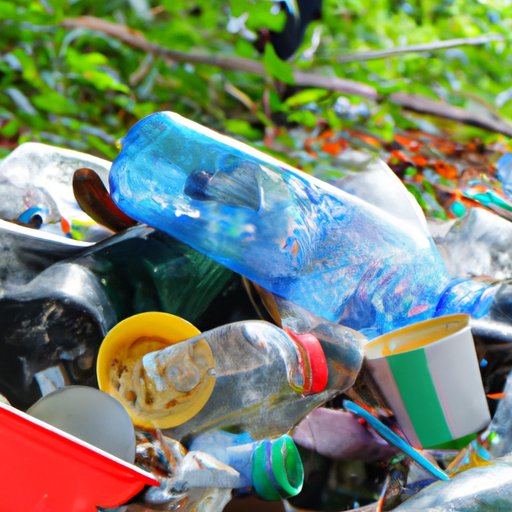Introduction
Garbage is an ever-present problem in our world, and it can have serious consequences for our health. Garbage is defined as any discarded materials that are considered to be useless, unwanted, or dangerous. It includes items such as food waste, plastic packaging, hazardous chemicals, and electronic waste. The global garbage crisis is a major issue that affects every nation and has far-reaching consequences for human health.
Environmental and Health Impacts of Landfills and Other Waste Disposal Systems
Landfills are the most common form of waste disposal. They are areas of land where solid waste is deposited and buried. While landfills can be effective in disposing of waste, they can also create pollution and health risks. Toxic chemicals from landfills can leach into soil and water, leading to contamination of drinking water sources and air pollution. In addition, landfills emit methane gas, which contributes to climate change. Finally, landfills can attract pests like rodents and insects, which can spread diseases.
Improper disposal of hazardous waste can have even more dire consequences. Hazardous waste includes materials such as solvents, paint, pesticides, and batteries. If not disposed of properly, these materials can contaminate soil and water, leading to health risks for humans and wildlife alike. Improper disposal can also lead to air pollution, as hazardous materials can release toxic fumes when burned.

Food Waste and Its Contribution to the Global Garbage Crisis
Food waste is a major contributor to the global garbage crisis. Every day, millions of tons of food are thrown away around the world. This food could have been used to feed hungry people, but instead, it ends up in landfills and incinerators, emitting greenhouse gases and contributing to air pollution. In addition, food waste can attract pests like rats and cockroaches, which can spread disease.
Food waste is especially problematic because it is often avoidable. The majority of food waste comes from households and restaurants, who throw away food that is still edible. Food waste can be reduced by proper planning and storage, as well as donating excess food to those in need.
Poverty and Garbage Accumulation
Poverty is another factor that contributes to the global garbage crisis. In many parts of the world, there are no organized systems for collecting and disposing of garbage. As a result, garbage accumulates in areas where poverty is high, leading to health risks for residents. This garbage can contain dangerous materials such as broken glass, metal, and plastic, which can cause injury or illness if handled improperly.
In addition, poverty can lead to improper disposal of hazardous materials. Without access to proper disposal systems, people in poverty may resort to dumping hazardous waste in rivers, lakes, and other bodies of water. This can lead to contamination of drinking water sources, as well as air and soil pollution.

Plastic Waste and Human Health
Plastic waste is one of the most pervasive forms of garbage, and it can have serious health implications. Plastic never fully breaks down; instead, it breaks into smaller and smaller pieces, known as microplastics. These microplastics can end up in our food and water supply, where they can be ingested by humans and animals. Ingesting plastic can cause health problems such as digestive issues and hormone disruption.
In addition, plastic production and disposal can contribute to air pollution. When plastic is burned, it releases toxins into the air, which can be harmful to human health. Finally, plastic waste can accumulate in oceans and other bodies of water, leading to water pollution and harm to aquatic life.
Economic Costs of Dealing with Garbage
Dealing with garbage can be expensive. Governments must spend money to collect and dispose of garbage, and businesses must pay to dispose of their waste properly. In addition, cleaning up polluted land and water can cost millions of dollars. Finally, health care costs related to illnesses caused by garbage can be significant.
The economic costs of dealing with garbage can be even greater if action is not taken. Pollution caused by garbage can damage ecosystems and lead to long-term health problems for humans and animals. These health problems can lead to increased medical costs, lost productivity, and decreased quality of life.

Strategies for Reducing Trash Generation
Reducing the amount of garbage produced is essential to solving the global garbage crisis. Individuals and households can reduce their trash output by recycling, composting, and using reusable containers. Businesses can take steps to reduce their waste by investing in sustainable packaging and finding ways to reuse or recycle their products. Finally, governments can implement policies to reduce waste, such as banning single-use plastics and providing incentives for businesses to reduce their waste.
Conclusion
Garbage has a huge impact on human health, both directly and indirectly. Landfills and other waste disposal systems can lead to air and water pollution, while food waste can attract pests and contribute to climate change. Poverty can lead to the accumulation of garbage, which can cause injury and illness. Plastic waste can leach into our food and water supply, causing health problems. Finally, dealing with garbage can be expensive, both financially and in terms of health care costs. To reduce the health impacts of garbage, individuals, businesses, and governments must work together to reduce trash generation.
(Note: Is this article not meeting your expectations? Do you have knowledge or insights to share? Unlock new opportunities and expand your reach by joining our authors team. Click Registration to join us and share your expertise with our readers.)
